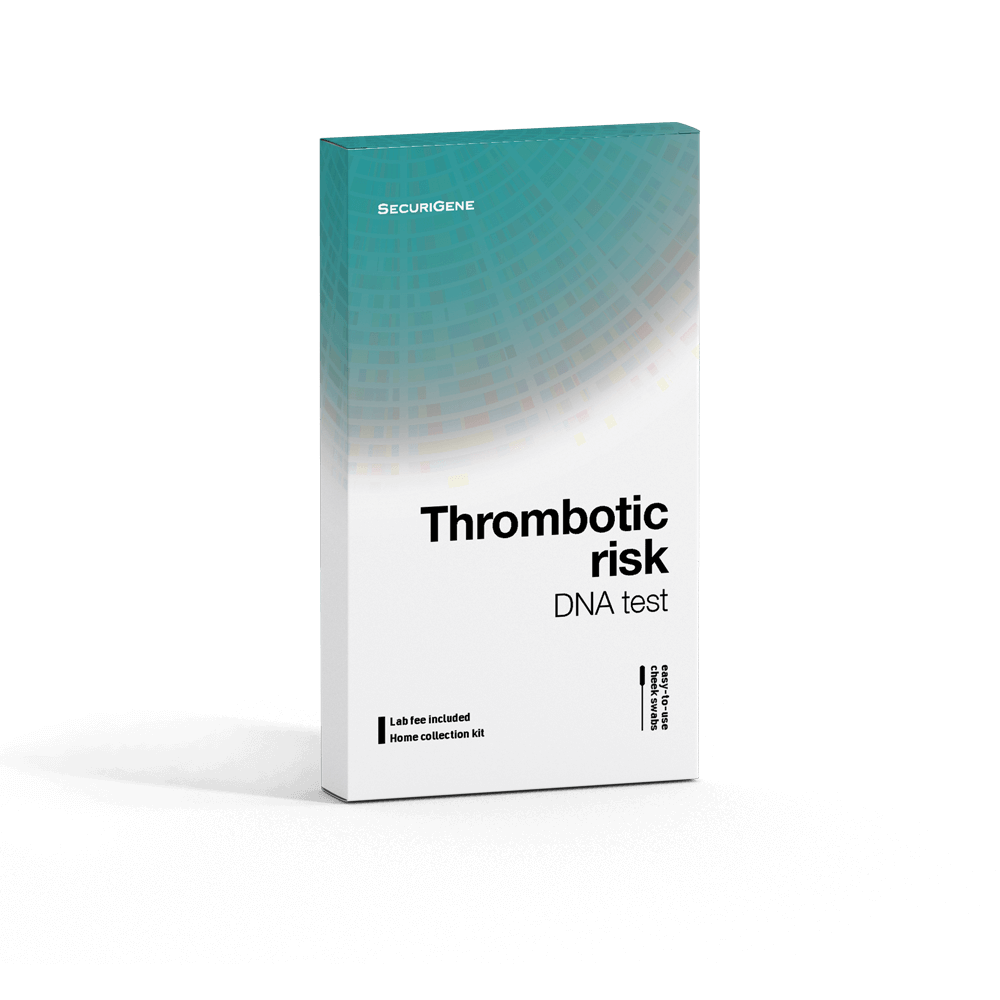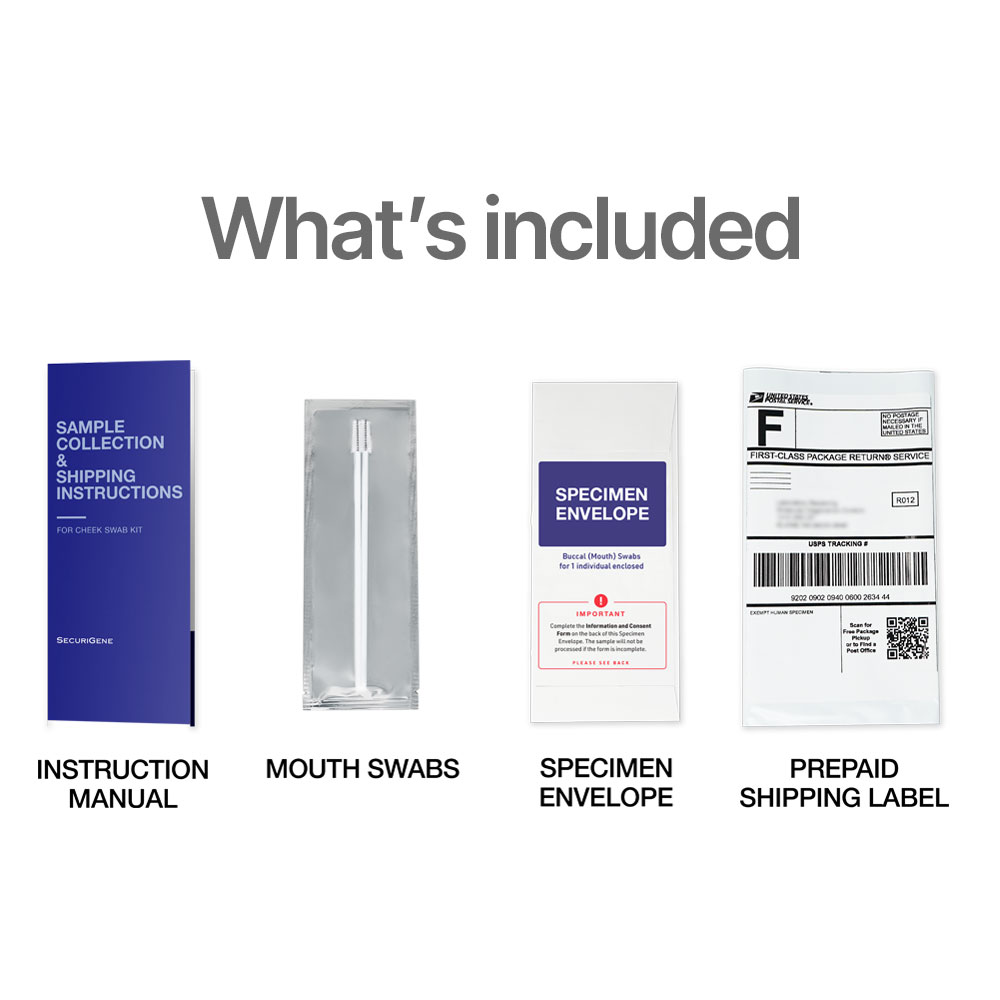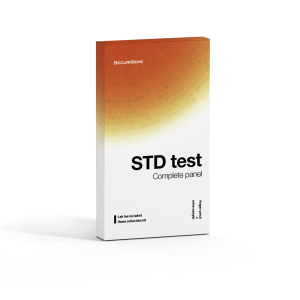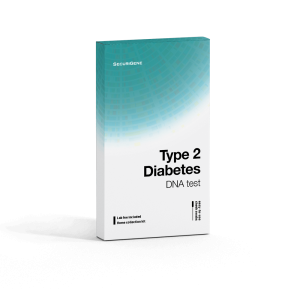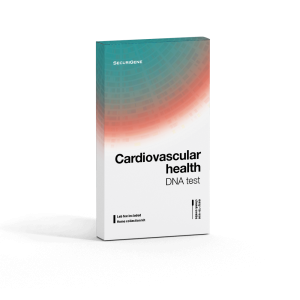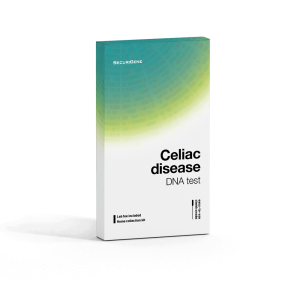No hidden lab fees. Free return shipping included.
Get secure results through your private online portal.
All samples are tested twice for absolute accuracy.
Do you have an increased risk of developing blood clots?

Thrombosis refers to the formation of blood clots within blood vessels, with deep vein thrombosis (DVT) being the predominant type. DVT occurs mainly in the legs, and is characterized by symptoms such as pain, swelling, redness, and warmth in the affected area.
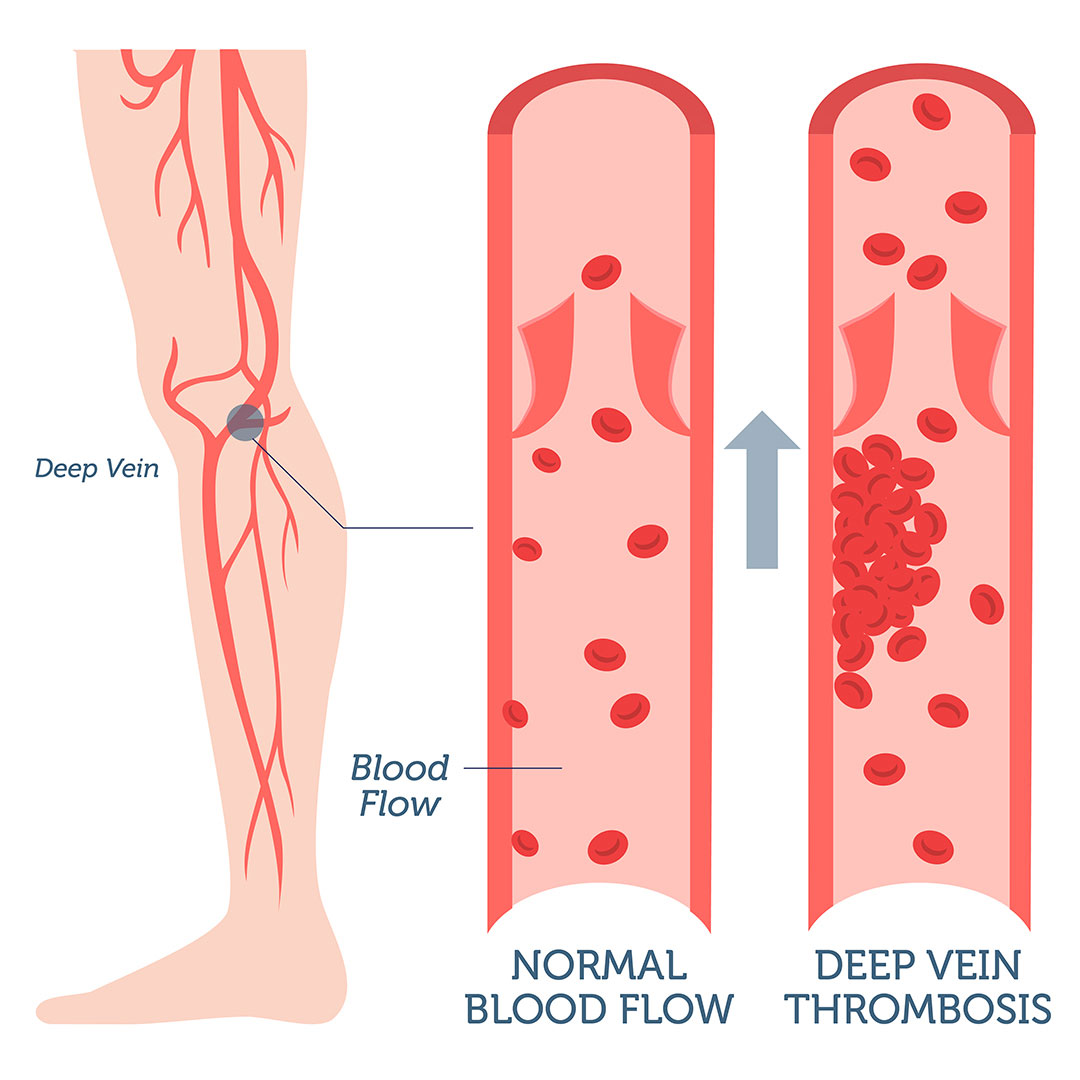
Prompt medical attention is crucial when suspecting DVT, as a clot may dislodge potentially leading to life-threatening complications like a pulmonary embolism (PE) if it reaches the lungs.
Furthermore, if a clot travels to the brain, it poses a severe risk of cerebral venous thrombosis, manifesting in symptoms like impaired speech, difficulty moving body parts, vision problems, and intense headaches.
A simple DNA test using a mouth swab can assess your genetic risk by analyzing the F5, F2, and MTHFR genes, providing insights into both your current susceptibility to blood-clotting issues and the likelihood of passing these genetic factors to future generations. This test can be an essential tool for proactive health management.
All-inclusive testing, with no hidden fees
- All lab fees
- DNA Collection Kit Supplies and Swabs
- Free return shipping
- Certified lab reports
- 2x testing for accuracy
- Full customer service & support
What’s inside your kit?
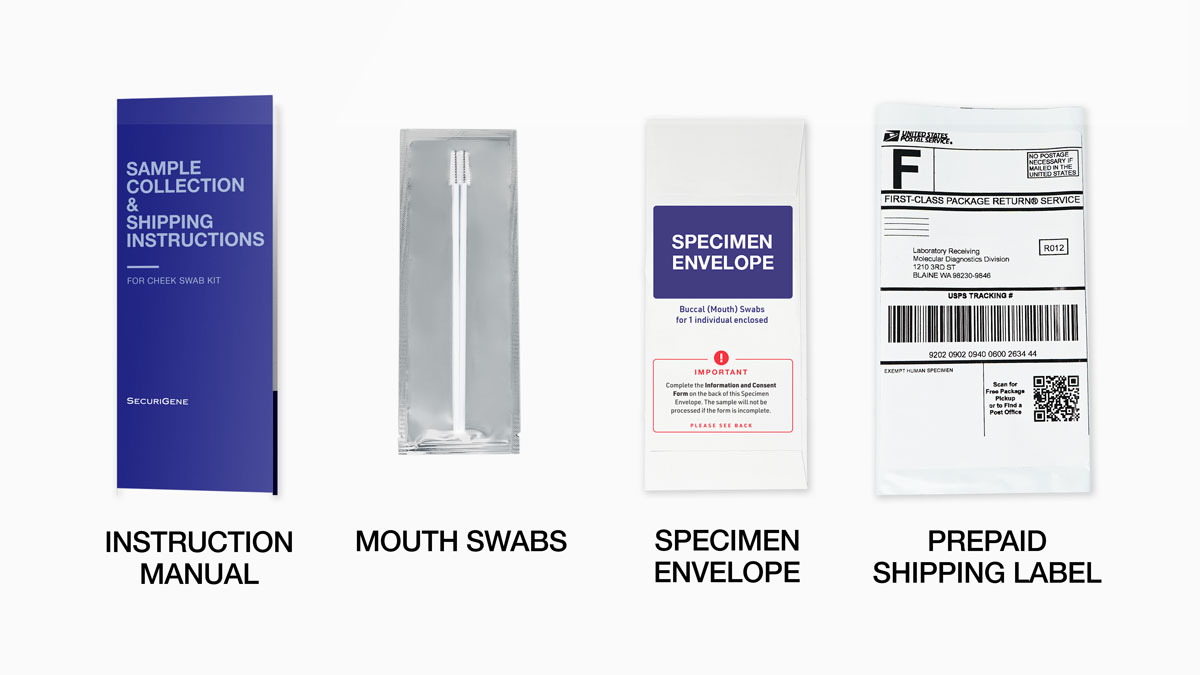
The Thrombotic Risk Home DNA Test analyzes 3 genes which are associated with an increased risk of thrombosis:
1. F5 – the Factor V Leiden mutation (1691G>A)
The most commonly inherited variant associated with thrombophilia is the factor V Leiden mutation. This mutation occurs in the F5 gene, which encodes factor V, a protein that promotes blood clotting. Factor V is produced in the liver in an inactive form. After activation, it aids in the conversion of prothrombin (encoded by the F2 gene) to thrombin. Thrombin is required for the production of fibrin (the main protein component of blood clots). When factor V is not required, it is normally degraded by protein C. However, when the factor V Leiden mutation (G1691A) occurs in the F5 gene, it is resistant to inactivation by protein C. This means that it remains active and increases the rate of thrombin generation, contributing to an increased risk of abnormal blood clotting.
2. F2 – Prothrombin G20210A Mutation
Prothrombin is another factor necessary for clotting. Increased prothrombin levels occur in individuals with the prothrombin G20210A mutation in the F2 gene. The F2 gene encodes prothrombin (or coagulation factor II). Coagulation factors are essential for normal blood clotting. Prothrombin is produced in the liver and circulates in the bloodstream. When a blood vessel is damaged, prothrombin is converted into active thrombin, which then coverts fibrinogen into fibrin. Excess prothrombin, which may occur due to the prothrombin G20210A mutation, leads to elevated thrombin levels and an increased risk of an abnormal blood clot.
3. MTHFR Variants
Variants in the MTHFR gene, such as C677T and A1298C, can also increase thrombotic risk. The MTHFR gene encodes methylenetetrahydrofolate reductase, an enzyme involved in the conversion of folic acid to biologically active folate. Active folate acts as a co-factor in the conversion of homocysteine to methionine. Homocysteine is a type of amino acid that is harmful at elevated levels, a condition known as hyperhomocysteinemia, which is associated with an increased risk of blood clots.
Genetic Risk Factors
We receive two copies of each gene, one from each parent, leading to the potential inheritance of either two normal copies (homozygous normal), two copies with a genetic mutation (homozygous mutant), or one normal and one mutated copy (heterozygous). For genes such as F5, F2, and MTHFR, various genetic combinations are linked to different thrombophilia risks.
| Patient Genotype | Thrombotic Risk |
|---|---|
| Factor V Leiden mutation (heterozygous 1691G>A) in the F5 gene | “3X to 8X increased risk of thrombosis 2X to 11X increased risk of miscarriage” |
| Factor V Leiden mutation (homozygous 1691G>A) in the F5 gene | “10X to 80X increased risk of thrombosis 2X to 11X increased risk of miscarriage” |
| Prothrombin mutation (heterozygous 20210G>A) in the F2 gene | “2X to 5X increased risk of thrombosis 2X to 3X increased risk of miscarriage” |
| Prothrombin mutation (homozygous 20210G>A) in the F2 gene | “>5X increased risk of thrombosis 2X to 3X increased risk of miscarriage” |
| Mutation (homozygous 677C>T) in the MTHFR gene | Increased risk of thrombosis if folate levels are low |
| Two mutations (677C>T and 1298A>C) in the MTHFR gene | Increased risk of thrombosis if folate levels are low |
Do you have an increased risk of developing blood clots?

Thrombosis refers to the formation of blood clots within blood vessels, with deep vein thrombosis (DVT) being the predominant type. DVT occurs mainly in the legs, and is characterized by symptoms such as pain, swelling, redness, and warmth in the affected area.

Prompt medical attention is crucial when suspecting DVT, as a clot may dislodge potentially leading to life-threatening complications like a pulmonary embolism (PE) if it reaches the lungs.
Furthermore, if a clot travels to the brain, it poses a severe risk of cerebral venous thrombosis, manifesting in symptoms like impaired speech, difficulty moving body parts, vision problems, and intense headaches.
A simple DNA test using a mouth swab can assess your genetic risk by analyzing the F5, F2, and MTHFR genes, providing insights into both your current susceptibility to blood-clotting issues and the likelihood of passing these genetic factors to future generations. This test can be an essential tool for proactive health management.
All-inclusive testing, with no hidden fees
- All lab fees
- DNA Collection Kit Supplies and Swabs
- Free return shipping
- Certified lab reports
- 2x testing for accuracy
- Full customer service & support
What’s inside your kit?

The Thrombotic Risk Home DNA Test analyzes 3 genes which are associated with an increased risk of thrombosis:
1. F5 – the Factor V Leiden mutation (1691G>A)
The most commonly inherited variant associated with thrombophilia is the factor V Leiden mutation. This mutation occurs in the F5 gene, which encodes factor V, a protein that promotes blood clotting. Factor V is produced in the liver in an inactive form. After activation, it aids in the conversion of prothrombin (encoded by the F2 gene) to thrombin. Thrombin is required for the production of fibrin (the main protein component of blood clots). When factor V is not required, it is normally degraded by protein C. However, when the factor V Leiden mutation (G1691A) occurs in the F5 gene, it is resistant to inactivation by protein C. This means that it remains active and increases the rate of thrombin generation, contributing to an increased risk of abnormal blood clotting.
2. F2 – Prothrombin G20210A Mutation
Prothrombin is another factor necessary for clotting. Increased prothrombin levels occur in individuals with the prothrombin G20210A mutation in the F2 gene. The F2 gene encodes prothrombin (or coagulation factor II). Coagulation factors are essential for normal blood clotting. Prothrombin is produced in the liver and circulates in the bloodstream. When a blood vessel is damaged, prothrombin is converted into active thrombin, which then coverts fibrinogen into fibrin. Excess prothrombin, which may occur due to the prothrombin G20210A mutation, leads to elevated thrombin levels and an increased risk of an abnormal blood clot.
3. MTHFR Variants
Variants in the MTHFR gene, such as C677T and A1298C, can also increase thrombotic risk. The MTHFR gene encodes methylenetetrahydrofolate reductase, an enzyme involved in the conversion of folic acid to biologically active folate. Active folate acts as a co-factor in the conversion of homocysteine to methionine. Homocysteine is a type of amino acid that is harmful at elevated levels, a condition known as hyperhomocysteinemia, which is associated with an increased risk of blood clots.
Genetic Risk Factors
We receive two copies of each gene, one from each parent, leading to the potential inheritance of either two normal copies (homozygous normal), two copies with a genetic mutation (homozygous mutant), or one normal and one mutated copy (heterozygous). For genes such as F5, F2, and MTHFR, various genetic combinations are linked to different thrombophilia risks.
| Patient Genotype | Thrombotic Risk |
|---|---|
| Factor V Leiden mutation (heterozygous 1691G>A) in the F5 gene | “3X to 8X increased risk of thrombosis 2X to 11X increased risk of miscarriage” |
| Factor V Leiden mutation (homozygous 1691G>A) in the F5 gene | “10X to 80X increased risk of thrombosis 2X to 11X increased risk of miscarriage” |
| Prothrombin mutation (heterozygous 20210G>A) in the F2 gene | “2X to 5X increased risk of thrombosis 2X to 3X increased risk of miscarriage” |
| Prothrombin mutation (homozygous 20210G>A) in the F2 gene | “>5X increased risk of thrombosis 2X to 3X increased risk of miscarriage” |
| Mutation (homozygous 677C>T) in the MTHFR gene | Increased risk of thrombosis if folate levels are low |
| Two mutations (677C>T and 1298A>C) in the MTHFR gene | Increased risk of thrombosis if folate levels are low |
Be Proactive With Your Health
Understanding your genetic risk provides you with the opportunity for early intervention and prevention through certain lifestyle changes.
Easy sample collection
Each kit contains painless, easy-to-use mouth swabs.
Quality assured
All testing is performed in our ISO 17025, AABB and CLIA certified laboratory.

Live status updates
Track the status of your order and view your results as soon as they are ready.

Private & confidential
Your data belongs to you. We do not share your data with any third party without your permission.
How it works
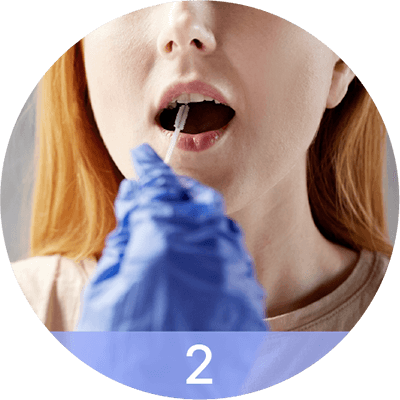
Collect & Send
Swab your mouth, then mail your samples to our lab. Free shipping included.
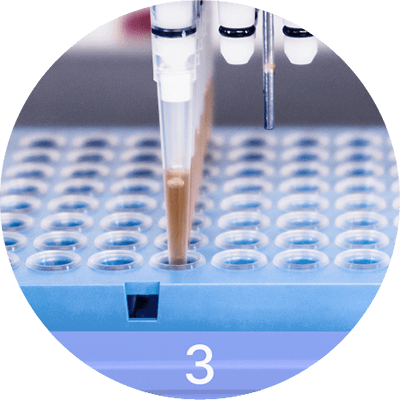
Get Results
Receive confidential results through your secure online portal.
FAQ
Answers to commonly asked questions about this test.
Thrombosis is a medical condition in which blood clots form in the veins or arteries, obstructing blood flow. The condition can lead to serious health problems, such as heart attack, stroke, or pulmonary embolism. Common risk factors include immobility, surgery, cancer, hormonal contraception, and genetic predisposition. Symptoms can include swelling, pain, or redness in the affected area. Treatment may involve medication, compression stockings, or surgery, depending on the severity of the condition. It is important to seek medical attention if you experience any signs or symptoms of thrombosis.
Yes, your results are 100% confidential. No one will be able to access your account or your results unless you give them your confidential account login. You can change the password to your account at any time. Please remember to safeguard your login information and not share it with anyone.
No. This test can be taken at any time, regardless of whether an individual has recently eaten or not. This test looks for the presence of specific alleles in your DNA, which is not impacted by what you recently ingested. Fasting is not necessary and will not affect the accuracy of results.
DNA testing begins immediately the day that your samples arrive at the laboratory and is completed within 2 to 4 weeks. In some special situations, additional testing may be required, which could increase the turnaround time by a few extra days. You can check the status of your test online 24/7 using your secure account login. Your test report is released immediately once testing is complete.
Once testing is complete, results are released immediately to your secure online portal. You may view, download and share your results with your physician or healthcare provider.
